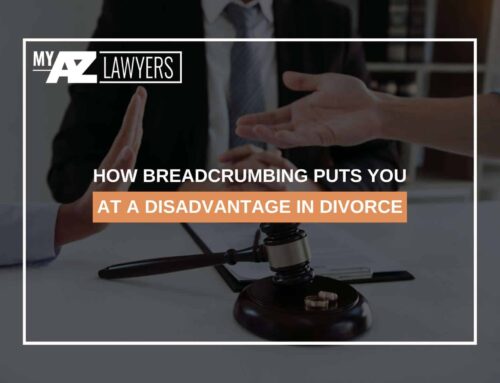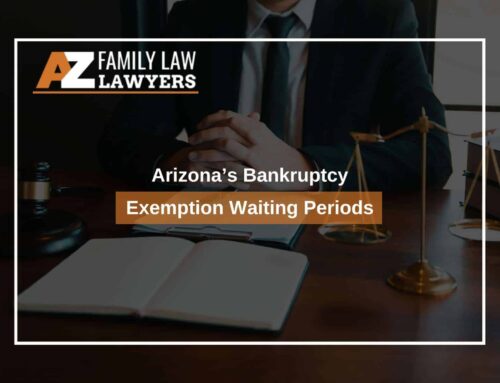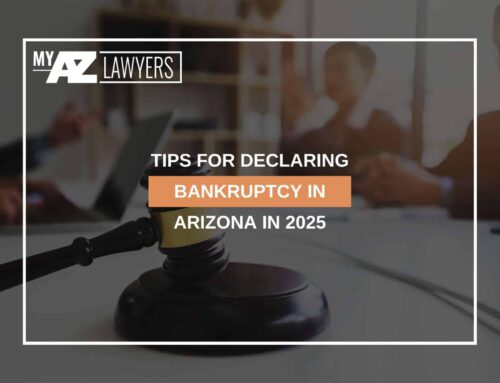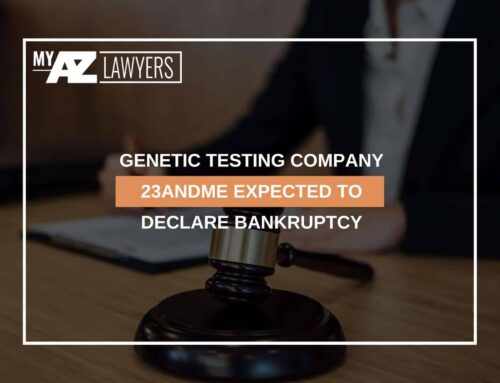Table Of Contents
Can I Clear My Medical Debt by Filing for Bankruptcy in Arizona?
There is no shortage of information about how healthcare expenses have spiraled out of control. Life-saving drugs cost thousands of dollars a month in some cases, and a single surgery can cost more than the price of a house. Insurance may cover some of that, but most insurance will not cover all of it. You may still owe tens of thousands of dollars for medical care, even if you have health insurance. If you don’t have health insurance, you could lose everything trying to pay off your medical bills.
Fortunately, you do have options other than struggling in debt for years or selling off everything you own to pay for your medical expenses. Filing for bankruptcy in Glendale may be able to help you get rid of your medical expenses or to make them more manageable to pay. You should talk with a Glendale bankruptcy attorney to find out exactly how bankruptcy can help your particular circumstances.
Medical problems can be chronic issues for some or occur unexpectedly. Anticipated or not, medical problems are almost always expensive. With inflation causing the cost of living to skyrocket over the past few years, an unexpected medical issue may simply not be in your budget. So what are your options if you have medical debt in Arizona? You may be able to work with your creditors on a payment plan or alternative payment arrangement and rely on Arizona’s limits on medical debt collection in the meantime. But if your medical debts are more than you can ever possibly pay off, bankruptcy could help clear your slate in a way that’s fair for both you and your creditors. If you’re considering a medical bankruptcy in the Phoenix area, call our firm for your free consultation at 480-470-1504 or click here.

Chapter 7 Bankruptcy
Filing for Chapter 7 bankruptcy in Phoenix can get rid of your medical expenses entirely. Chapter 7 bankruptcy discharges, or erases, all unsecured debt – which is debt that is not backed by some property as a promise in case of default. Doctors, hospitals, and other medical providers do not have the right to seize your home or personal property if you do not pay them. They are unsecured creditors, which means they have only your word that you are going to pay.
Before you can file for Phoenix Chapter 7 bankruptcy, you have to qualify. You must pass a means test, which looks at your income in comparison to the average, as well as other factors. If you do not pass the means test, you cannot file for Chapter 7, and you cannot completely liquidate your medical debts.
If you do qualify for Chapter 7, there is no limit on how much medical debt you can discharge. You could have hundreds of thousands of dollars in medical debt, and it can all be cleared when the bankruptcy is closed, which typically takes only a few months.
Chapter 13 Bankruptcy
If you cannot file for Chapter 7 bankruptcy, you can still get some relief from medical debt by filing for Chapter 13 bankruptcy in Mesa. Under Chapter 13, a debt repayment plan is created for you based on your ability to pay. You can put all your medical debt into a three- to five-year repayment plan. You will pay a lower monthly payment, avoid late fees and other penalties, and then likely have your debt dismissed when the repayment plan is over.
Filing for Mesa Chapter 13 bankruptcy will put an end to the calls and letters you receive from your debtors, and it will give you an endpoint for paying off your debt. You also have the option to pay less of your debt than you would if you were just paying the bills as they came in.
Filing for Chapter 7 or Chapter 13 bankruptcy in Phoenix can provide you with great relief from overwhelming medical debt. You might get immediate relief from all debt with Chapter 7, or you might reduce the burden by putting your debt into a manageable repayment plan under Chapter 13. You should talk to a bankruptcy attorney serving Phoenix to determine which chapter of bankruptcy would be best for your financial circumstances and your goals. Your Arizona bankruptcy attorney can help you understand the best course of action to take to reach your goals as quickly as possible.
Proposition 209
Proposition 209 went into effect in Arizona on December 5, 2022. It makes changes to medical debt collection in Arizona, specifically regarding wage garnishments, interest rates, and protection from collections.
Wage garnishments are a commonly-used debt collection method. Once a creditor has a judgment showing the debtor owes money, they can use that judgment to obtain a writ of garnishment from the court. Once the debtor’s employer has received notice of the garnishment, they must automatically deduct the garnishment from the debtor’s paycheck and send it to the creditor. The balance from a wage garnishment debt may end up being much higher than the original balance due to interest and legal fees. Previously, Arizona’s limit for medical debt wage garnishments was 25% of the debtor’s paycheck. Now that Prop 209 is in effect, the limit for medical debt wage garnishments is only 10%. The court can reduce the garnishment further if the debtor can prove that failure to do so would cause extreme financial hardship.
Without a contract indicating otherwise, many types of debts are capped at a 10% interest rate. However, Prop 209 caps medical debt interest rates at 3% or the annual rate used by the Federal Reserve Board for the calendar week of when the debtor first received their bill- whichever is lower.
There are certain amounts of property that Arizona lets debtors protect from creditors. They are usually relatively low and represent baseline necessities for a debtor to live. Prop 209 increased Arizona’s homestead exemption (the amount of equity a debtor can hold in a home, not the home’s market value) from $150,000 to $400,000. It increased the exemption for household goods and furnishings from $6,000 to $15,000. It also raised the motor vehicle exemption from $6,000 to $15,000. However, if the debtor has a physical disability, the motor vehicle exemption increased from $12,000 to $15,000. All of these exemptions will increase in 2024 with the cost of living. If you have any questions about how Prop 209 could affect your medical debt collections, don’t hesitate to contact our firm for your free consultation- click here or call 480-470-1504.
Medical Debt Collection & the Automatic Stay
Even though medical debt collection practices in Arizona have been limited by the passage of Prop 209, it can still be serious enough that the debtor may need further protection from the court. A wage garnishment reduced from 25% to 10% could financially devastate a debtor all the same. Reduced interest rates might not mean much if the debtor lives paycheck-to-paycheck and can’t make headway on the balance. Juggling living expenses with debts, including medical debts, can make it harder to stay current on bills like rent and utilities. Therefore, even with protections extended by Prop 209 for Arizonans struggling with medical debt, it’s entirely feasible for a medical debtor to need additional help.
When a debtor files for bankruptcy, they become protected by the automatic stay. The automatic stay can help a person deal with any type of debt in several ways. The automatic stay stops lawsuits, including lawsuits filed by creditors, while the bankruptcy is active. It also applies to evictions that haven’t reached the writ of possession stage yet. The automatic stay stops wage garnishments, although a child support wage garnishment will only stop with a fully-paid Chapter 13 filing. It can stop the repossession of vehicles and other assets. The automatic stay can also stop a home foreclosure and even utility shut-offs. It can also stop your creditors from using bank account levies to collect your debts.
Emergency Bankruptcy
If you need to declare bankruptcy quickly to stop a wage garnishment or other collection stemming from medical debt, you may need to file an emergency bankruptcy. An emergency bankruptcy petition requires far less information than a full bankruptcy petition. The debtor will only need to include income information, contact information, and their first credit counseling course in their emergency bankruptcy petition, also known as a skeleton petition. The debtor has 2 weeks after filing a skeleton petition to complete the rest of their bankruptcy filing. If you need to file bankruptcy fast, it still needs to be done accurately. Our skilled bankruptcy team can provide swift assistance- click here or call 480-470-1504 for your free consultation.
Hospital Debt Forgiveness
If you have unpaid hospital bills and don’t have the income to pay them off, you may qualify for hospital debt forgiveness. Most hospitals are required to have payment assistance programs for low-income patients. These policies are usually based on the income guidelines for the federal poverty level. For example, a debtor who earns 100% of the federal poverty level will have their bill reduced more than a debtor whose income is 400% of the federal poverty level. A medical debtor applying for hospital debt forgiveness may need to supply information like tax returns, pay stubs, bank statements, and more.
Can I Receive Medical Treatment If I File Bankruptcy on My Medical Bills?
If you have an outstanding balance with most types of service providers, they will no longer provide you with that service if you discharge your unpaid bill in bankruptcy. For the most part, this applies to private doctors and other medical providers like dentists, surgeons, etc. Whether or not to continue treating you after erasing their bill with bankruptcy will be the doctor’s personal decision. If you must continue treatment with that specific doctor, you might have to pay off your balance despite your legal obligation to pay it off being cleared. However, hospital emergency rooms may not deny you service due to a prior bankruptcy filing, even if one of their bills was discharged by that bankruptcy.
Contemplating Medical Bankruptcy in Phoenix? Start Here.
Bankruptcy can be an effective tool to wipe away excessive medical debts, but it isn’t the right solution for everyone. Your income and property could be exempt from medical creditors, or you may qualify to have some or all of your medical debt forgiven. But if these situations don’t apply to you, our experienced team at My AZ Lawyers can walk you through your options. Clear debts, protect yourself from creditors, and secure your assets with a skilled Phoenix bankruptcy lawyer. Most of our clients qualify to file for as little as zero dollars down. To schedule your free phone consultation, contact us through our online form or call 480-470-1504.
Arizona Offices:
Mesa Location:
1731 West Baseline Rd., Suite #100
Mesa, AZ 85202
Office: (480) 448-9800
Email: info@myazlawyers.com
Website: https://myazlawyers.com/
Phoenix Location:
343 West Roosevelt, Suite #100
Phoenix, AZ 85003
Office: (602) 609-7000
Glendale Location:
20325 N 51st Avenue Suite #134, Building 5
Glendale, AZ 85308
Office: (602) 509-0955
Tucson Location:
2 East Congress St., Suite #900-6A
Tucson, AZ 85701
Office: (520) 441-1450
Avondale Location:
12725 W. Indian School Rd., Ste E, #101
Avondale, AZ 85392
Office: (623) 469-6603














